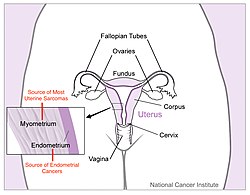Uterine cancer
Editor-In-Chief: Prab R Tumpati, MD
Obesity, Sleep & Internal medicine
Founder, WikiMD Wellnesspedia &
W8MD medical weight loss NYC and sleep center NYC
| Uterine cancer | |
|---|---|

| |
| Synonyms | N/A |
| Pronounce | N/A |
| Specialty | N/A |
| Symptoms | Abnormal vaginal bleeding, pelvic pain, weight loss |
| Complications | Metastasis, anemia, infertility |
| Onset | Most common in postmenopausal women |
| Duration | Varies |
| Types | Endometrial cancer, uterine sarcoma |
| Causes | Genetic mutations, hormonal imbalances |
| Risks | Obesity, diabetes, hypertension, nulliparity, early menarche, late menopause |
| Diagnosis | Pelvic examination, transvaginal ultrasound, endometrial biopsy |
| Differential diagnosis | Cervical cancer, ovarian cancer, endometriosis |
| Prevention | Weight management, oral contraceptives, physical activity |
| Treatment | Surgery, radiation therapy, chemotherapy, hormonal therapy |
| Medication | N/A |
| Prognosis | Generally good if detected early |
| Frequency | Most common gynecologic cancer in developed countries |
| Deaths | Varies by stage and treatment |
Cancer that forms in tissues of the uterus
Uterine cancer is a type of cancer that originates in the tissues of the uterus. The most common type of uterine cancer is endometrial cancer, which begins in the lining of the uterus, known as the endometrium.
Types
Uterine cancer primarily includes two types:
- Endometrial cancer: This is the most prevalent form of uterine cancer, accounting for more than 90% of cases. It typically occurs in postmenopausal women and is often detected at an early stage due to abnormal vaginal bleeding.
- Uterine sarcoma: This is a rarer form of uterine cancer that originates in the muscle or other tissues of the uterus. It is more aggressive and has a poorer prognosis compared to endometrial cancer.
Symptoms
Common symptoms of uterine cancer include:
- Abnormal vaginal bleeding or discharge
- Pelvic pain
- Pain during intercourse
- Unexplained weight loss
Risk factors
Several factors can increase the risk of developing uterine cancer, including:
- Obesity
- Diabetes
- Hypertension
- Use of estrogen without progesterone
- Family history of uterine or colorectal cancer
Diagnosis
Diagnosis of uterine cancer typically involves:
Treatment
Treatment options for uterine cancer depend on the stage and type of cancer and may include:
- Surgery: The most common treatment is a hysterectomy, which involves the removal of the uterus.
- Radiation therapy
- Chemotherapy
- Hormone therapy
Prognosis
The prognosis for uterine cancer varies based on the type and stage of the cancer at diagnosis. Early-stage endometrial cancer has a high survival rate, while uterine sarcoma has a less favorable outcome.
Prevention
Preventive measures include maintaining a healthy weight, managing chronic conditions like diabetes and hypertension, and discussing the risks and benefits of hormone therapy with a healthcare provider.
Epidemiology
Uterine cancer is the fourth most common cancer in women in the United States. The incidence is higher in developed countries compared to developing countries.
Images
See also
References
Transform your life with W8MD's budget GLP-1 injections from $125.
W8MD offers a medical weight loss program to lose weight in Philadelphia. Our physician-supervised medical weight loss provides:
- Most insurances accepted or discounted self-pay rates. We will obtain insurance prior authorizations if needed.
- Generic GLP1 weight loss injections from $125 for the starting dose.
- Also offer prescription weight loss medications including Phentermine, Qsymia, Diethylpropion, Contrave etc.
NYC weight loss doctor appointments
Start your NYC weight loss journey today at our NYC medical weight loss and Philadelphia medical weight loss clinics.
- Call 718-946-5500 to lose weight in NYC or for medical weight loss in Philadelphia 215-676-2334.
- Tags:NYC medical weight loss, Philadelphia lose weight Zepbound NYC, Budget GLP1 weight loss injections, Wegovy Philadelphia, Wegovy NYC, Philadelphia medical weight loss, Brookly weight loss and Wegovy NYC
|
WikiMD's Wellness Encyclopedia |
| Let Food Be Thy Medicine Medicine Thy Food - Hippocrates |
Medical Disclaimer: WikiMD is not a substitute for professional medical advice. The information on WikiMD is provided as an information resource only, may be incorrect, outdated or misleading, and is not to be used or relied on for any diagnostic or treatment purposes. Please consult your health care provider before making any healthcare decisions or for guidance about a specific medical condition. WikiMD expressly disclaims responsibility, and shall have no liability, for any damages, loss, injury, or liability whatsoever suffered as a result of your reliance on the information contained in this site. By visiting this site you agree to the foregoing terms and conditions, which may from time to time be changed or supplemented by WikiMD. If you do not agree to the foregoing terms and conditions, you should not enter or use this site. See full disclaimer.
Credits:Most images are courtesy of Wikimedia commons, and templates, categories Wikipedia, licensed under CC BY SA or similar.
Translate this page: - East Asian
中文,
日本,
한국어,
South Asian
हिन्दी,
தமிழ்,
తెలుగు,
Urdu,
ಕನ್ನಡ,
Southeast Asian
Indonesian,
Vietnamese,
Thai,
မြန်မာဘာသာ,
বাংলা
European
español,
Deutsch,
français,
Greek,
português do Brasil,
polski,
română,
русский,
Nederlands,
norsk,
svenska,
suomi,
Italian
Middle Eastern & African
عربى,
Turkish,
Persian,
Hebrew,
Afrikaans,
isiZulu,
Kiswahili,
Other
Bulgarian,
Hungarian,
Czech,
Swedish,
മലയാളം,
मराठी,
ਪੰਜਾਬੀ,
ગુજરાતી,
Portuguese,
Ukrainian
Contributors: Prab R. Tumpati, MD


